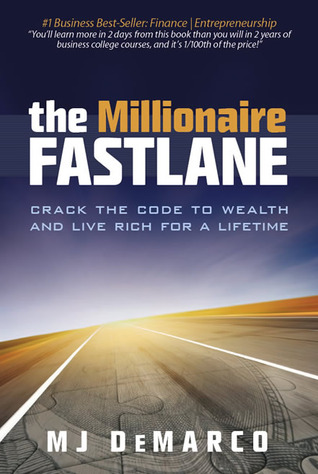Cross-posted from Goodreads.
Humorous and light, the book offers a handful of new insights into what it takes to become wealthy. MJ DeMarco is a self-made multimillionaire who developed his own brand of millionaire philosophy through his wide-ranging experiences from odd jobs and thriving businesses. If you’ve watched YouTube videos from the modern breed of productivity “gurus” and financial “experts,” you’ll find yourself at home with most of the book’s advice. If not, you are in for a meaty treat.
The author’s key argument is that money earned in exchange for time is not wealth (as in a job). The only way to earn wealth and get rich is to remove time from the equation (as in business or investment). Most of the book provides fodder to support this argument and discusses high-level concepts to help readers follow the “fastlane.”
The book focuses on entrepreneurship as the main fastlane to riches and freedom from time-for-money slavery. I was intrigued by the concept of Fameless Millionaire – the rich without fame or physical talent.
The core message is similar to Tim Ferriss’ 4-hr work week – get yourself out of the work equation by automating your work and processes. But rather than purely relying on automation/outsourcing from the start, the book suggests doing the initial hard work to build a product that will allow you to free yourself later. Despite the similarities, the author is openly critical of other productivity hacks like those in 4-hr work week, rich dad poor dad, and more.
The general tone of the author comes across as aggressively and cockily mean, which is not entirely bad. He’s trying to make good points bluntly. But I must say that some road analogies seem forced and require re-reads to understand.
DeMarco’s original success story appeared incomplete without details such as how the hefty offers to sell his company materialized, how he took it to successful ways after buying it back, etc.
Also, most supporting facts and statistics are based on the US economy and lifestyle. Yet, the book tries to generalize its theories to all people in the world. I’m not saying that it weakens the theories considerably, but it does make a difference. Eg. the sidewalkers are more abundant in the west due to a bigger middle class. In developing countries, family/societal values sometimes protect folks against consumerism and ruthless spending.
My biggest takeaway from the book is to not start a business just for the sake of financial freedom. Treat it like a hobby, and you earn like a hobby. Starting the right business should require deliberate thinking. The book provides a good framework for making that decision.

[…] It’s also similar to the financial independence vision that’s central in MJ DeMarco’s book The Millionaire Fastlane. […]